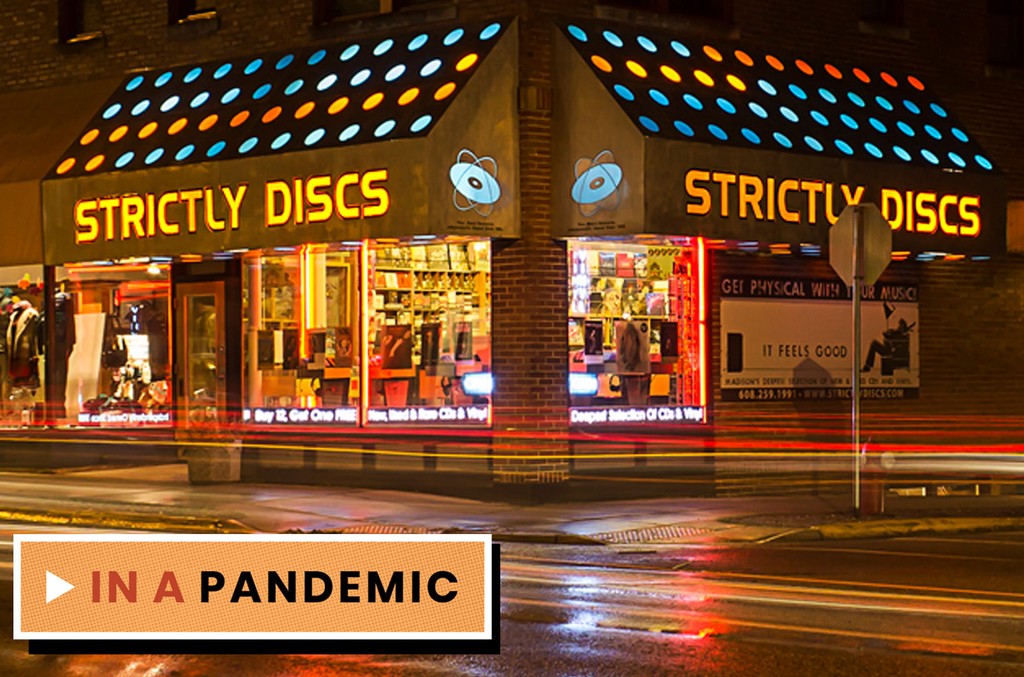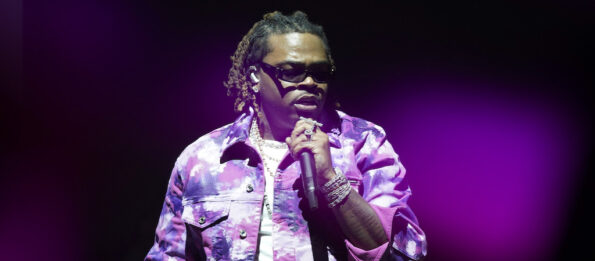With protests roiling the city of Madison, the record store made a show of solidarity with the Black Lives Matter movement.
In October 1988, Angie Roloff and her husband Ron opened Strictly Discs in Madison, Wisconsin, after Ron left a career in the biomedical research field to pursue his love of music full time. Nearly 31 years later, the couple made the difficult decision to shutter in-store operations due to COVID-19, roughly a week before Governor Tony Evers forced a mandatory shutdown of all non-essential businesses. Now that the Wisconsin Supreme Court has overturned Evers’ stay-at-home order — ruling it “unlawful” and “unenforceable” — the Roloffs and their employees are preparing to reopen Strictly Discs in a limited capacity for the first time since mid-March.
As part of Billboard’s efforts to best cover the coronavirus pandemic and its impacts on the music industry, we will be speaking with Roloff each week to chronicle her experience throughout the crisis. (Read last week’s installment here and see the full series here.)
Obviously a lot has happened in the last week. I know there have been several days of protests in downtown Madison. Have any of those been close to the shop?
Not so far. We’re about a mile from the Capitol Square, and for the most part they have been isolated to downtown, although I know there was one in a neighboring community yesterday.
How things are going out in Madison right now? What have you seen and experienced over the past week?
As you alluded, up until today we’ve had five days of peaceful and powerful protests downtown, largely on the Capitol Square. The first three nights of those were followed by some violence and looting of businesses that are also located close to the Capitol. There’s a retail street that connects [the University of Wisconsin–Madison] campus with the Capitol called State Street. It’s an automobile-free street, and that’s where most of the looting and damage to property has taken place.
Has there been any looting in your neighborhood?
There has not, at least none that I’m aware of. There are a couple of businesses that preemptively boarded their windows, but that’s the minority.
Did you board your windows?
We did not.
I noticed on the store’s Instagram that you’re donating 15% of proceeds every Tuesday in June to local Black Lives Matter initiatives in response to the killing of George Floyd and Black Out Tuesday. Have you decided which initiatives to support yet?
[This last] Tuesday, we wanted to be timely, because obviously these organizations need funds now. So we donated [those] proceeds to the umbrella organization of Black Lives Matter, and then we are going to brainstorm as a group for the subsequent Tuesdays now that we have a little bit more time to plan for that.
Would you be willing to tell me how much you donated this past Tuesday?
You know, sometimes we get kind of burdened by the fact that our actions don’t seem significant, but then I try to remind myself that everything is a small step towards progress. So I think Tuesday’s grand total was right around $300.
That’s a big deal.
It’s something. It’s better than nothing, is how we feel.
What has the response from the community been to your announcement of solidarity and also to the donation initiative?
It’s been really positive. [For] Black Out Tuesday, we wanted to make sure to respond in a thoughtful and respectful way. As a group, we kept going back to the organizers’ statement [where] they said, “We will not continue to accept business as usual without regard for black lives.” We kept going back to that as a group and we talked to some customers. You know, what does that mean? A lot of people interpret that as closing for the day. We felt it would be more productive to be open and donate a portion of the proceeds and to do that throughout the month. Hopefully [the donation amount will grow], especially since this Tuesday so many people were participating in the protests. But perhaps on subsequent Tuesdays, we might be able to get some more people in here and create some momentum for charity.
What has it been like as a business — as opposed to an individual — in deciding how to respond to what’s happening? Has that been difficult? Has that been confusing? What is that feeling?
I think it’s almost the same [as being an individual]. We’re a group of individuals and we want to make a difference, and we want to be respectful to our place in our community. I think we’re all very cognizant of our place as white Americans and making sure that we are respectful to the greater issues at hand. And so I think that’s just trying to do the right thing, and to make sure that we communicate that respectfully.
I wanted to also ask you about your T-shirt fundraiser. How has that been going?
It’s been great. The first part of the campaign closed and the T-shirts started to ship. I haven’t gotten mine yet, but I got quite a few pictures yesterday of people who had started to receive them in the mail. So that was a bright spot.
What percentage of the proceeds do you receive as a store?
It varies. There’s a little bit of a different margin on each of the products, whether it’s a sweatshirt or a T-shirt. But in the first campaign, I believe we sold right around 250 products. So those could be any one of the different t-shirts or sweatshirts, and I believe the proceeds for us for that campaign were right around $3,000.
Is there anything else that you wanted to mention before we wrap things up?
Something that we’ve talked about a lot — and in a record store it can mean something a little bit different, but I think it’s a universal idea — [is that], at the end of the day, the power to listen is the power to transform, whether that’s to music or to other people. And so that’s kind of what we’re working with.




